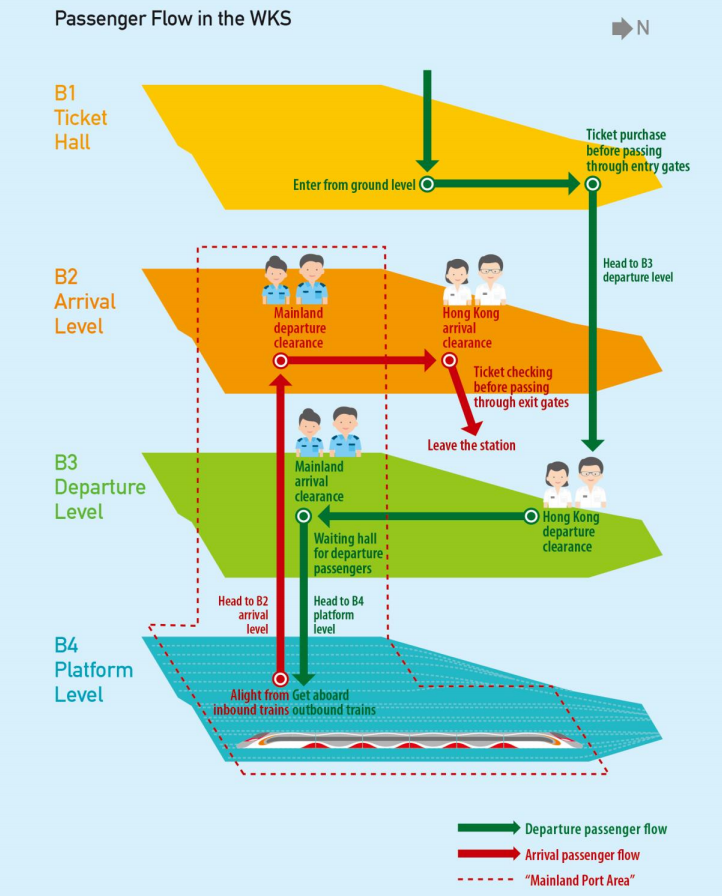A group of activists have proposed an alternate plan for the HK$84.4 billion Express Rail Link’s joint checkpoint to be located in a mainland station, instead of at the Hong Kong terminus.
The initial government proposal for the Guangzhou-Shenzhen-Hong Kong railway’s West Kowloon terminus will involve “leasing” land to China and effectively giving up Hong Kong jurisdiction across a quarter of the terminus for faster immigration procedures performed by mainland law enforcement agents. Pro-democracy groups have raised concerns over what they called the ceding of territory to the mainland and potential violations of the Basic Law.
The “Co-location” Concern Group – formed by academics, lawmakers and activists – made a counter suggestion that the joint checkpoint for Hong Kong and mainland customs, immigration and quarantine procedures should be located at one of the stations along the route – Futian, Shenzhen North or Guangzhou South station. The group said their plan would not increase the travel time for passengers.

The group said it proposed seven alternative plans and the current one was chosen by an internal vote on Sunday.
Leung Kai-chi, an academic in the group, said current estimates showed that 80 per cent of passengers will take short haul trains to Shenzhen or Guangzhou, according to government documents given to the Legislative Council. Thus, implementing a joint checkpoint on the mainland will not cause them inconvenience, he said.
The three mainland stations have all reserved space for checkpoint facilities.
“We believe the effectiveness is more or less the same,” he said. “But an advantage of our proposal is that there will not be any legal challenges.”
Leung added that the remaining 20 per cent of passengers taking long haul trains will also enjoy more frequent trains to other mainland city destinations if they transfer at Shenzhen North or Guangzhou South.
“For instance, if they are going to the Chaoshan railway station, the government said there will only be one or two trains from Hong Kong every day. But there are 70 trains going there from Shenzhen everyday,” Leung said. “Changing at Shenzhen is a normal and reasonable choice for many people.”
_Shenzhen_Bei_Zhan_-_panoramio.jpg)
The group’s proposal suggested that the unused space at West Kowloon, which is reserved for the mainland port area, could be used for commercial purposes to bring in rent revenue.
It will be similar to the Shenzhen Bay control point arrangement made in 2007, in which Hong Kong leased land from Shenzhen.
The government has compared its own proposal to the Shenzhen Bay model. It said it will take steps to declare a mainland port area, which will no longer be legally part of Hong Kong, in order to bypass the Basic Law requirement that mainland laws cannot be exercised in Hong Kong.
But lawmaker Tanya Chan disagreed with the government’s comparison: “If we can have a joint checkpoint in the mainland, then that would be the real Shenzhen Bay model. Having a joint checkpoint at West Kowloon is not the same as the Shenzhen Bay model.”

Chan claimed that the current government proposal violates Article 18 and 22 of the Basic Law. Article 18 stipulates that mainland laws shall only be applied in Hong Kong if they are in Annex III of the Basic Law – which currently does not include mainland immigration laws – whilst Article 22 stipulates that mainland authorities shall not interfere in Hong Kong affairs.
Chan said the group will ask Secretary for Justice Rimsky Yuen, Secretary for Transport and Housing Frank Chan, and Secretary for Security John Lee for a meeting and a potential public debate.
The government refused the group’s proposal in a leaflet issued last month, saying that passengers will need to alight at the mainland station midway through their journeys before they board again after clearance procedures.
“This arrangement will be extremely inconvenient for passengers; it will prolong the overall travelling time, diminish the usefulness of the XRL in connecting seamlessly to the national high-speed rail network and greatly impact on [sic] the efficiency and functionality of the XRL,” it said.
